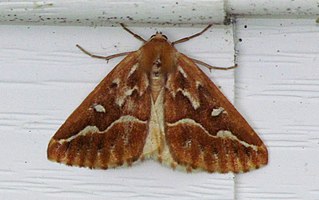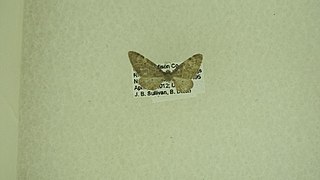
The Ourapterygini are one of the large tribes of geometer moths in the subfamily Ennominae. The tribe was described by Charles Théophile Bruand d'Uzelle in 1846. They are particularly plentiful in the Neotropics. Ourapterygini are generally held to be the youngest tribe of their subfamily, and at least seasonally have characteristic apomorphic asymmetrical processes of the anellus.
Archirhoe is a genus of moths in the family Geometridae.

Caripeta is a genus of moths in the family Geometridae erected by Francis Walker in 1863.

Digrammia was a genus of moths in the family Geometridae erected by Carl Freiherr von Gumppenberg in 1887. It is now often considered a synonym of Semiothisa.
Eubarnesia is a monotypic moth genus in the family Geometridae erected by Theodore Dru Alison Cockerell in 1917. Its only species, Eubarnesia ritaria, described by Grossbeck in 1910, is found in the American South West.
Glaucina is a genus of moths in the family Geometridae erected by George Duryea Hulst in 1896.

Nematocampa is a genus of moths in the family Geometridae.

Pero is a genus of moths in the family Geometridae erected by Gottlieb August Wilhelm Herrich-Schäffer in 1855.
Prorella is a genus of moths in the family Geometridae erected by William Barnes and James Halliday McDunnough in 1918.

Synchlora is a genus of moths in the family Geometridae erected by Achille Guenée in 1857. Adult Synchlora members often have leaf green wings, while larvae occasionally have the property of adorning themselves with pieces of plants in the pursuit of camouflage. The name of the genus comes from Greek, with "syn-" meaning "with", and "chlor" meaning "green".

Eupithecia swettii is a moth in the family Geometridae first described by John Arthur Grossbeck in 1907. It is found in eastern North America, from Quebec and Massachusetts to North Carolina in the south-east and through Missouri and Kansas to Mississippi. It is also found in eastern Texas.
Eupithecia huachuca is a moth in the family Geometridae. It is found in Arizona and Texas.
Eupithecia purpurissata is a moth in the family Geometridae first described by John Arthur Grossbeck in 1908. It is found in the US state of California.
Prorella emmedonia is a moth in the family Geometridae first described by John Arthur Grossbeck in 1908. It is found in the US states of California and Arizona.

Prorella discoidalis is a moth in the family Geometridae first described by John Arthur Grossbeck in 1908. It is found in the US states of Arizona, New Mexico and Utah.
Prorella remorata is a moth in the family Geometridae first described by John Arthur Grossbeck in 1907. It is found in the US state of Arizona.
Prorella artestata is a moth in the family Geometridae first described by John Arthur Grossbeck in 1908. It is found in the US states of Arizona and Texas.
Prorella mellisa is a moth in the family Geometridae first described by John Arthur Grossbeck in 1908. It is found in the US states of California, Arizona, Colorado and Montana. Adults have been recorded on wing in May and from July to October.
Nematocampa baggettaria, or Baggett's spanworm moth, is a moth of the family Geometridae. It is found in Florida, Georgia, Louisiana and North Carolina.
Lithostege elegans is a species of moth in the family Geometridae. It is found in North America, where it has been recorded from Arizona.








